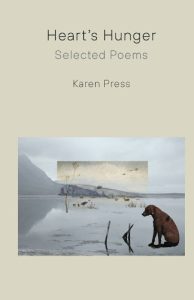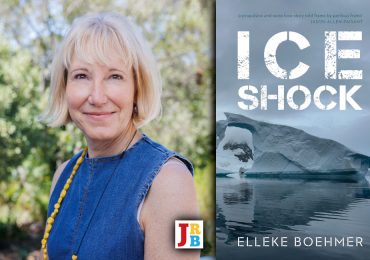To read Karen Press’s Heart’s Hunger is not just to know where we have come from, but to feel in a very visceral way what it has meant, what it does mean, to have been born here, writes Finuala Dowling.

Heart’s Hunger: Selected Poems
Karen Press
Deep South, 2024
For more than thirty years, Karen Press’s poetry has held a mirror up to South Africa. In it, we have seen our shame and our (rarer) heroism, recognised our locales, acknowledged our history, mourned our dead and laughed at our foibles. Heart’s Hunger, a judicious selection from eight collections, is a welcome publication from a quietly distinguished poet who has avoided the limelight. What shines out is not a personality or, God forbid, a brand, but exquisitely precise diction, compassionate observation and imaginative power. To read Heart’s Hunger is not just to know where we have come from, but to feel in a very visceral way what it has meant, what it does mean, to have been born here.
The collection opens with the iconic, often prescribed poem ‘This Winter Coming’, from Press’s 1990 collection, Bird Heart Stoning the Sea. Its insistent refrain ‘who is not frightened?’ gathers momentum; by the end, the reader is in no doubt that what we must fear is not winter’s coming storms, but what is about to be unleashed in this country after decades of disenfranchisement, oppression and poverty. Press is a poet who knows that part of her calling is to be prescient.
‘This Winter Coming’ sits snugly beside ‘Not forgetting’, a short poem that mixes beachy, summery possibilities (ice cream, lying on a towel, surfing) with dire political realities that do not and cannot reference sunshine—prison, coffin, graveyard.
To understand our coming winter, the impossibility of summer, Press returns to the origin of the problem. I have met a few South Africans who trace their ancestry back to Krotoa/Eva, and I hope they will buy this book to read ‘Krotoa’s story’, a magnificent evocation of the first colonial intrusion into the Cape, spoken in the voice of a woman who was one of its first victims. The sister-in-law of the Cochoqua chief, Krotoa is sent to the fort to become an interpreter. After months of terrible loneliness and painful adaptation she at last sees a living being she recognises: ‘a cow from Oedasoa’s kraal. I used to milk her. I could not stop myself from crying.’
It’s poetry as an act of clairvoyance, of summoning the dead. Press gives English words to Krotoa’s moving Epilogue, yet so tactful is the imagery, we believe we are hearing it in the language of this country’s first people:
I am looking for one bird—
A bird from the flock of tall lagoon-dwellers
That I watched quietly digging for fish
In the waters of my childhood—
One who will listen to me
And then tell my story to one another
Who in turn will pass it on
Along the edges of the lagoon
Up and down the coast these ships follow
Forever, let it lodge between the stones of every beach
Where my own tears have carried on the waves
To moor themselves:
Krotoa became Eva
And then became again
Krotoa
died at the Cape, 29th July 1674
and is remembered
The poet seldom, or only clandestinely, turns her compassionate observation towards herself, but when she does, the result is a lyrical triumph. ‘Causality and Chance in Love’ celebrates a love affair that was almost not possible, between a poet who lives in Sea Point and a prisoner on Robben Island, perhaps Neville Alexander, with whom Press had a close bond:
Mist rising on the winter waves
swathed your quarried words in veils
and blew them in to fill my chest with sleeplessness.
I watched the kelp arms of sea creatures reaching through the swell.
You caught the glint of closed windows on the sunlit hills.
Only the wind passing across your lips
and then across my lips, preoccupied with its cargo of rain,
could have imagined us both in the same breath.
But there are also poems I found difficult to parse. In the title poem, ‘Heart’s Hunger’ we do not know (I do not know) whether the speaker, a heartbroken, bereft woman abandoned in love, is akin to the poet, or a figure like Krotoa from our country’s history, homeless, suffering, trying to make something out of nothing.
It’s as if Press knows some of her poems might baffle. For example, the poem ‘Incarnate identity’, which begins:
Arrive screaming
in this blood-birth
steel and the roses in my eyes
nor any grief will still me
not for your most holy suffering will I lay down
my wings in this necessary massacre
with all my life seizing the jasmine growing
from the whole where they raped me
how it grows and grows
ends with ‘homework’ for the bemused reader. We are offered a table of words showing all the categories of meaning we can extract from the word ‘blood’, which has featured so strongly in the poem. These include ‘relation, family, breed, seed, own flesh, kin, culture, tribe, clan, own flesh, bloodshed, slaughter, slaying, extermination, own flesh, sap, liquid, gore, own flesh, life force, heart’s blood, own flesh’. I did my ‘homework’ and saw that the grievous harm done in the poem was committed, as so many crimes are, by ‘own flesh’, family.
‘Incarnate Identity’ presages Press’s later poem ‘Men wear secret masks’. Again, the apparent impunity of gender-based violence is the theme:
This happens in every house.
There is always an ancestral bird
In the shape of a man
Singing in the shape of a flute.
There is always a woman
Seeing something that could kill her.
Press’s commitment to bringing ravaged female histories to light reaches its height in these lines from ‘Eight frescoes from the lost palaces of Zanj’:
She gave birth while prison guards tortured her and laughed
only a goddess could do this
The Polish poet Czesław Miłosz once asked, What is poetry which does not save / Nations or people? Press is interested in the same question, and its close relative: What is a poet who can only offer the compassion of a distant observer? We do not have to agree with Miłosz’s answer: A connivance with official lies, / A song of drunkards whose throats will be cut in a moment. Those are just the words of a poet beating himself up about the apparent impuissance of his art. A poet’s work is to pull us back from thoughtlessness and numbed indifference. A poet’s work is to find words when the unspeakable happens, as it does now, daily, in an era of total digital news coverage. In her poem ‘Aching’, Press speaks for the helplessness of all of us:
If I could just catch the man falling
there so high so tiny
if I could just
push my hand through the screen
into the burning city
I’d be bleeding he’d be screaming
The terror would be real
Later in the same poem she writes:
Don’t stare, it’s rude.
And empathy is rape.
The same ambiguity—a poet questioning her right to say what she is saying—imbues a poem dated ‘Venice, 11 September 2001’. It contains the rich yet reined-in lines:
My 9/11 was a day in a city
With nothing better to do than cloak me lightly
In a thundercloud of antique beauty
What stays with me is Press’s masterful evocation of place. The final sequences, ‘Songs for the Tourist in Cape Town’ and ‘Sites of Interest’, provide vivid, insightful and instantly recognisable portraits of the city and its visitors. Also, a helpful (and satirical) ‘Itinerary’ for the latter:
Shop.
Eat.
Drink.
Smoke.
Dance.
Swim.
Climb.
Find a pharmacy.
Sleep.
Dance.
Drink.
Smoke.
Stand on the pavement at dawn
waiting for an Uber.
My own favourite poem in Heart’s Hunger is Press’s praise poem to Muizenberg, where I live. It evokes an idyll that could spread to the rest of South Africa:
Where the kids with surfboards don’t hide in cars
from the kids with drugs and knives,
where the toasted cheeses and falafels and almond croissants
all sit on the same pavement tasting the sea.
where the communists and preachers and yoga teachers
are on the same WhatsApp group
and the rusted fences and bougainvilleas prick with the same force
there is a weathered place that loves its people.
- Finuala Dowling was born in Cape Town, a city she has recorded in both her fiction and her poetry. She has taught English at the University of South Africa and the University of Cape Town as well as other institutions, but now works as a freelance writer and creative writing teacher. Her five collections of poetry include Pretend you Don’t Know Me, a new and selected volume that brings together many of her most popular poems. Her sixth novel, The Man Who Loved Crocodile Tamers, was published in 2022.






We chant! We bow! We turn around!!! We do da ululate!!!!
Khulile!?
My god… of all the gin joints, etc.
How are you?